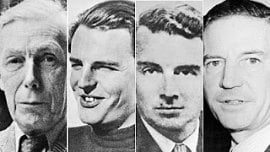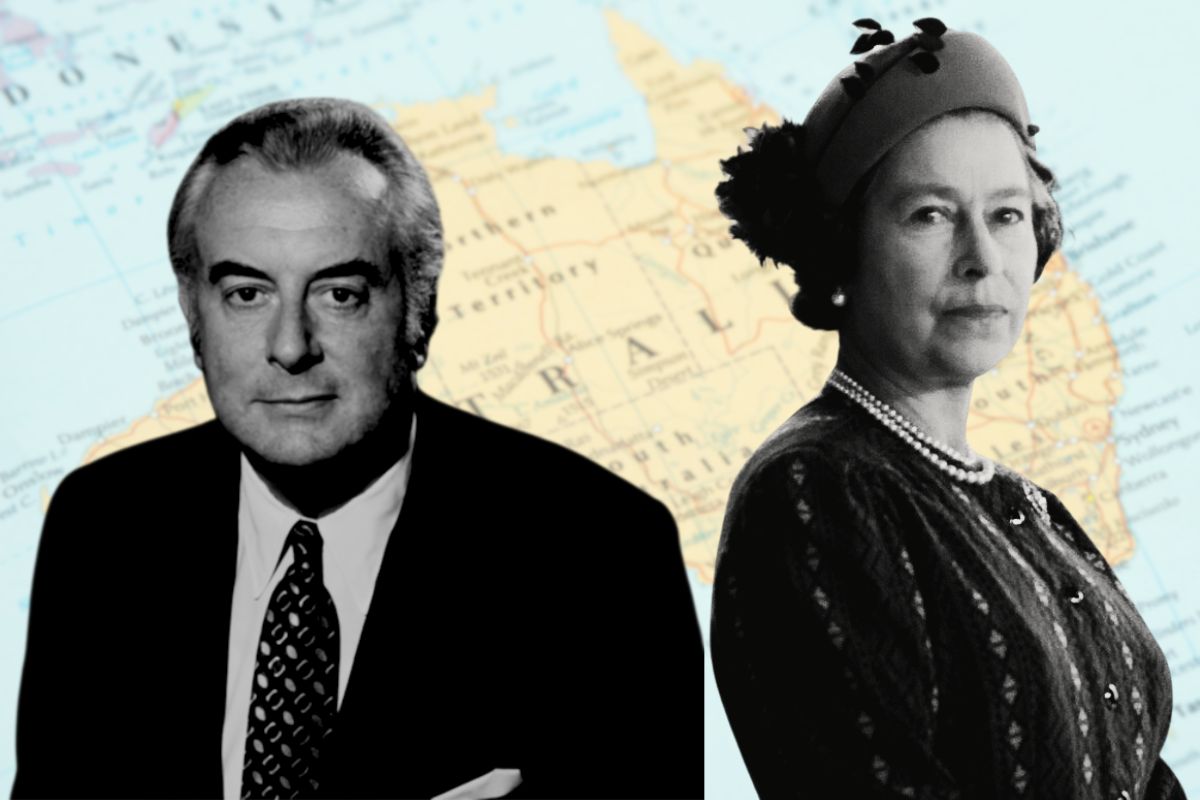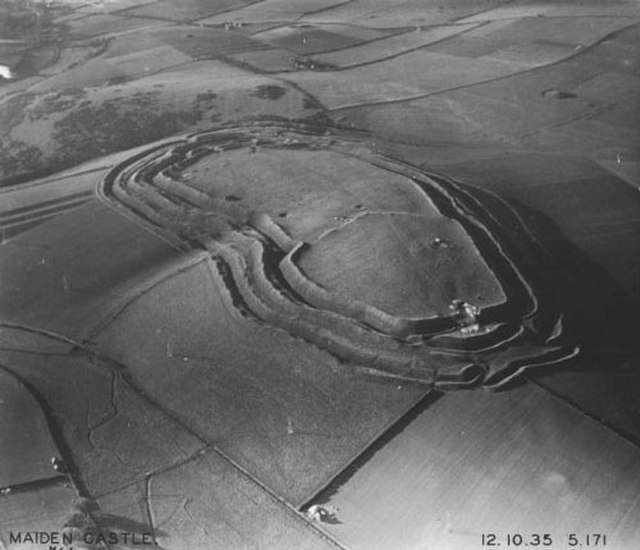The story of the British spies, recruited by the KGB in the 1930s whilst at the University of Cambridge, holds a perverse fascination for academics, novelists and conspiracy theorists. Ironically, what almost every discussion, documentary and book about the spies lacks is a Marxist understanding of these events, based on a materialist view of history.
The story of the British spies, recruited by the KGB in the 1930s whilst at the University of Cambridge, holds a perverse fascination for academics, novelists and conspiracy theorists. The history of this spy ring has been told and re-told, debated and discussed countless times with different ideas about how and why these men became Soviet agents and what impact their espionage had in the Cold War. Ironically, what almost every discussion, documentary and book about the spies lacks is a Marxist understanding of these events, based on a materialist view of history.
The precise facts surrounding the Cambridge spies are unclear, probably for the fairly obvious reason that both they and the people who unmasked them were spies and therefore good at distorting the truth and keeping secrets. But what is clear is that four men – Guy Burgess, Anthony Blunt, Kim Philby and Donald MacLean – who grew up in the decidedly privileged surroundings of private schools and the University of Cambridge, were recruited, while still students, by the KGB to spy on Britain for the Soviet Union.
From Cambridge to Communism
A favourite question of the biographers is how such well brought up youngsters became dangerous communists who betrayed the British Establishment into whose ranks they had been welcomed with open arms. This question has been answered in a variety of ways, ranging from portraying it as an act of revenge against a system that punished homosexuality severely (three of the four spies were gay), to a naive accident in which the students were tricked into becoming Soviet agents.
Poring over the detail of the personal lives of these four people in an attempt to understand their communist ideas is not a very useful exercise. Contrary to the image that the ruling class would like to portray, such ideas were widespread among young people in the 1930s. Burgess, Blunt, Philby and MacLean were not strangely exceptional in their ideas, and the reason for this is not to be found in accidental personal experiences but in the historical circumstances in which these men found themselves.
1929 saw the most severe crisis of capitalism in history, a crisis that shook the system to its foundations just a few years after the General Strike of 1926. The impact of that crisis on an entire generation of young people was dramatic. The imperialist slaughter of the First World War was also still fresh in the minds of many people and the threat of Fascism in Europe, along with the sympathy of many elements of the British ruling class towards fascist ideas, was having a radicalising effect on consciousness. The crowning factor naturally was the shining example of the Russian Revolution in 1917 and the apparent successes of the USSR since then. While the rest of the capitalist world was in crisis, the Soviet Union acted as a beacon for young people looking towards a brighter future.
Sure enough, this manifested itself throughout the 1930s in the success and growth of the Stalinist Communist Party, enormous public sympathy for the demands and action of groups such as the National Unemployed Workers’ Movement, and in the spirited fight against Fascism both in Britain and in Spain, led by young people and workers inspired by the ideas of communism.
It is this landscape of capitalist decline that holds the key to the development of the spies’ communist ideas, despite their privileged upbringing. Marx and Engels say in the Communist Manifesto that “in times when the class struggle nears the decisive hour, the process of dissolution going on within the ruling class, in fact within the whole range of old society, assumes such a violent, glaring character, that a small section of the ruling class cuts itself adrift, and joins the revolutionary class, the class that holds the future in its hands”. It is thus the decrepit nature of British – and world – capitalism at that time that explains why people like Burgess, Blunt, Philby and MacLean were able to see the necessity of abandoning the sinking ship of the capitalist ruling class that their upbringing would traditionally have led them to and joining the fight for a better future.
From Communism to Stalinism
However, the story of the Cambridge spies is the all too familiar one of a revolutionary commitment to the emancipation of the working class being distorted and emasculated by the criminal policies of Stalinism. In this particular case, this took the form of grooming these young communists in the art of espionage rather than engaging them in the concrete task of building a revolutionary communist tendency in Britain.
This flowed naturally from Stalin’s policy of ‘socialism in one country’ and his desire not to upset the imperialist powers; a policy that was also being vigorously pursued in the Spanish civil war at the same time. Moscow’s willingness to sacrifice revolutionary potential in both cases was neatly exemplified by the orders that Kim Philby received to go to Spain as a journalist with The Times to report favourably on Franco and his Fascist movement, with the additional aim of getting close enough to Franco to assassinate him. This was a win-win situation for Moscow which would either end up with a spy who had proved his right-wing credentials to the British ruling class, thus giving him an in-road into the Establishment, or else they would end up with a great propaganda victory in the death of Franco via individual terrorism, without having had to rely on collective mass action of the Spanish working class to fight Fascism. In the end it was the former set of circumstances that prevailed, and Philby successfully convinced the British Establishment that his communism had simply been a passing phase in his youth, thus paving the way for his entry into the British intelligence services.
Spies are not revolutionaries. Trotsky, in the preface to his History of the Russian Revolution, says that “the most indubitable feature of a revolution is the direct interference of the masses in historical events”. This is the very antithesis of espionage, which seeks to keep the masses away from and ignorant of events by using coded messages, backroom deals and whispered secrets. From a Stalinist point of view such methods were perfect; they allowed Moscow to keep tight control over “revolutionary” activity in Britain – something it would never have been able to do with a mass working class movement.
Spying is nothing more than a game of chess played behind the backs of the workers, and which has no more impact upon the lives of the majority of people than a game of chess ordinarily would. In fact, when Anthony Blunt was publically revealed as the fourth man in the Cambridge spy ring, it also came to light that the British Establishment had known that fact for many years, but had chosen simply to do nothing much about it. They were able to keep Blunt under control with threats, knowing that he had no mass movement to back him up or to defend him, and therefore that he posed no real threat to them at all. Unlike genuine revolutionaries, spies have very little impact upon great historical events.
The fact that these spies were recruited from elite academic circles is no coincidence. Firstly, the British Establishment was then, as now, an old boys’ network in which the top jobs depended on who you knew. Cambridge men would have been well placed to infiltrate such a system. And secondly, these people were privileged students and academics, not workers. They had an understanding of Marxism and the principles of communism, not because they had developed the collective consciousness that comes from strike action and unionisation, but solely from text-books and academic discussions. As Lenin points out in What is to be Done? neither pure trade union economism, nor dry academia can give a person an understanding of Marxism – communism is about the unity of theory and practice. By turning these potential revolutionaries into spies, the KGB isolated them from the collective experience of the masses and prevented them from developing an understanding of genuine Marxism. Thus they were turned into obedient tools of the Stalinist bureaucracy, without political education or understanding.
Espionage or economics?
Some have described the Cambridge spies as ‘moles’ rather than ‘spies’ because they were not merely engaged in passing information to the Soviet Union, but also tried to influence British policy towards the USSR. The most commonly given example of this was the decision of the British, after Hitler invaded the USSR, to stop decoding secret Soviet messages. This decision has been attributed in part to the work of Burgess and Philby who occupied influential positions in the British intelligence services. Examples like this have raised questions and wild speculation as to the extent that the Cambridge spies impacted the course of the Cold War.
The Cold War was, fundamentally, a conflict between the capitalist mode of production on the one hand and a planned economy on the other. It has always been clear throughout history that the society with the stronger mode of production will triumph over any others – it is this economic question, at bottom, that defines the course of history.
The USSR survived for as long as it did, going from one of the most backwards countries in the world to the second most powerful nation on earth in just 50 years, because the planned economy was so strong. This is also why it was able, almost single-handedly, to defeat the Nazis in the Second World War. These successes have almost nothing to do with the subversive activities of a handful of spies occupying mid- or even high-level positions in the British establishment.
Ultimately the USSR collapsed because it was crippled by a parasitic bureaucracy, which led to inefficiency and corruption that acted as cancer on the health of the planned economy. Capitalism triumphed only thanks to the bureaucratic torpedo that sank the superior economic model of a planned economy. These great historical events were not engineered by small groups of conspirators, but by the balance of class forces on a global scale. It was the attempt to build socialism in conditions of economic isolation and backwardness that ultimately led to the degeneration and collapse of the Soviet Union, not the activities and espionage of any spies. To insist upon the enormous impact that the Cambridge spies had on the course of the Cold War is to misunderstand the processes of historical development.
In fact the impact of the Cambridge spies in their own limited spheres was fairly minimal. Although it is true that Kim Philby was made head of Soviet counter-intelligence (in essence stopping people like him becoming people like him), which allowed him to pass particularly useful information to the USSR, for the most part the Establishment positions taken up by the spies were of limited use. Positions in the Foreign Office, the BBC, mid-ranking intelligence officers, and the Surveyor of the King’s pictures could be used only to a limited extent.
This strategy of the spies was for a number of tactical reasons, such as the need for the spies to maintain their cover; but it also highlights the problem of trying to wield existing state power in the interests of the working class. Capturing positions in any branch of the state without a mass base of support leads to impotence and a betrayal of revolutionary aims. Clearly the case of the Cambridge spies is an extreme one, not least because the revolutionary aims were hardly present in the first place thanks to the poison of Stalinism. But it does demonstrate the impotence of taking a position in the existing state machine that is tied by a thousand threads to the capitalist mode of production. Everything that someone in that position does is measured against the interests of the capitalist class, and so to use such a position to strike significant blows against that class – without having the full mobilised backing of the working class – is impossible.
“Communists disdain to conceal their views and aims”
The Cambridge spies were dedicated to the need for a better world. They risked everything to fight for that world. They recognised that the defence of the Soviet Union was vital to the interests of the international proletariat; but this recognised fact took on a distorted form through the lens of Stalinism.
Trotsky points out that genuine internationalism consists of fighting for the proletariat of all countries, and that the best way to defend socialism in one particular country is to fight for it in all countries. This cannot be done through the shady world of intelligence and counter-intelligence operations but only by speaking the truth to the masses and boldly spreading the ideas and methods of Marxism.
This is the work that genuine revolutionaries today are carrying out all over the world, in the tradition of Marx and Engels, who stated in the Manifesto:
“The Communists disdain to conceal their views and aims. They openly declare that their ends can be attained only by the forcible overthrow of all existing social conditions. Let the ruling classes tremble at a Communistic revolution. The proletarians have nothing to lose but their chains. They have a world to win.”






